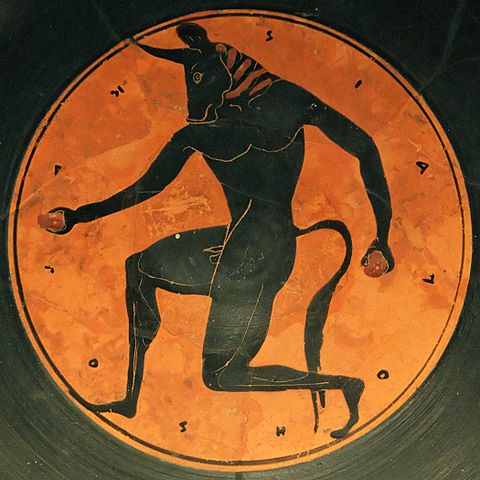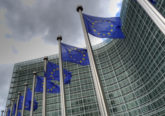
A long time before she relocated to Brussels, Europa was a Phoenician princess. Zeus was particularly fond of her and abducted the princess in the guise of a bull. She bore him a son, Minos, who also had his fair share of trouble with bulls. It was he who constructed the legendary labyrinth to keep the Minotaur at bay. Moreover, it was Minos too, who demanded that Athens periodically sacrifice its best boys and girls to that insatiable creature; half-man, half-bull. Until Theseus finally killed it.
Today, again, Europe has become enthralled by ‘the bull’ and it seems the consequences are equally unfavorable. Since the eighties, mutual expectations of economic growth have all but replaced concrete shared experience as the foundation for European political solidarity. Now that bull-markets have given way to bears we start to see the disastrous results: what was meant to foster European political solidarity has paradoxically become a source of deep division. Europeans must reconsider what initially brought them together and what still binds them beyond the ‘common market’ and joint currency. Otherwise Europe might soon join the fortunes of her mythical predecessors.
The logic of the current crisis is as fundamental as it is basic: it shows that political solidarity defined purely in terms of economic output is no solidarity at all. This is not to suggest that output is irrelevant but to highlight that solidarity ought to show itself, rather than retreat, in times of crisis. Political solidarity can only exist when political parties accept how their fortunes are tied up and recognise the normative commitments this entails. However, it can exist equally only when all parties share a mutual understanding of its limits. This is because political solidarity must be supported by a concretely shared political experience. The extent to which parties share a particular experience determines the level of political solidarity. In any case, however, it is foolish to suggest that the edifice of political solidarity can be sustained by the mere establishment of an economic foundation.
So what used to be the concrete basis for political solidarity on the European continent? Very simply, a shared experience of the destruction and the horrors of two wars which left the continent in tatters. The generation of our parents and grandparents tragically learned what political division could lead to. This reinforced a sense of shared responsibility to prevent a similar collapse from recurring. There is no need here for nostalgia; the new reality of the Cold War did as much as anything to urge the parties to the table. Nonetheless, the goal was clear and limited in scope, as were the mutual responsibilities it entailed: political stability through limited economic cooperation. We must keep in mind that economic development was never a goal in itself. It remained firmly tied to the overarching commitment to political stability.
The rest of the story is familiar. In the early eighties various parties in Europe wanted to move beyond the political stalemate that had characterised much of the prior decade. This, combined with the rise of Japan and the stagnant European economies, again focused the attention on ideas which had existed for some time: further integration of national European economies into an integrated common market, and even a joint currency. Such plans seemed to appeal to all major political and economic factions on the continent. Market integration suited liberals and business round-tables; social-democrats thought it might kick-start the stagnant economy; and for federalists it suggested a renewed attempt at full political European integration. In hindsight, however, we can spot an ambiguity in this plan: first, it directed attention away from political cooperation to economics; and second, it suggested that economic integration could pave the way for further future political integration. Expected economic growth thus replaced existing political solidarity as the plaster to hold together the continent.
In a fit of genuine Hegelian irony, it was the very common financial markets — the liberal engines of growth and prosperity — that came to haunt European politics with the arrival of the financial crisis. What is much more disconcerting is that with the demasqué of this logic of a ‘solidarity of winners’, the last remaining pillar supporting European political solidarity is now in danger of crumbling. In the meantime, politicians and pundits alike continue to batter it with a single-minded economic treatment that suggests they are more interested in establishing a level playing field than in preparing a reconstruction job.
However, what they really should be doing is asking the question: what, if anything, may help to supplement it?
First, we must start to understand that ‘solidarity’ is not a natural concept within the vocabulary of economics. This means that we have to stop analysing a political crisis primarily in financial terms. Second, we have to recognise the dangers of reconstituting our political cooperation primarily on economic development. This is because the appeal of such an argument is based on a variable beyond our control: economic growth. More simply, it misjudges the concept of a foundation, namely that it must be able to withstand certain pressures. Third, we must rapidly come to terms with the corrosive effect this reductionist mode of thinking continues to have on political debate in Europe. And lastly, it is about time we again start taking seriously the limits to and reassess the concrete foundations of European solidarity. This means European politicians will have to stop pretending these limits do not exist (federalism; one size fits all fiscal policy) and start emphasising what space for cooperation they do leave open.
Above, we presented the story of economic integration in the eighties. However, it is far more important to note that around the same time, Portugal, Spain and Greece entered the European Community. Less than ten years prior none of these countries would have been a democracy. More generally, half of the current members up till very recently struggled with communism or fascism. This includes the formerly ‘democratic’ Eastern part of Germany. Next year we welcome Croatia, the recent battleground of the greatest tragedy in post-war Europe. These facts speak to a truth which is at once more basic and pragmatic than any economic argument could ever be. Namely, that we must start appreciating whatever limited form of political solidarity we share, rather than continuing on a disastrous road of integrating Europe literally ‘at all costs’.
Otherwise, those bridges to nowhere ominously gracing our common currency will finally lead us into a labyrinth — and this time Theseus might not be around.
Rutger Kaput is a Dphil student in political theory at St Antony’s College. He is Deputy Graduate Editor at Politics In Spires.







No Comment